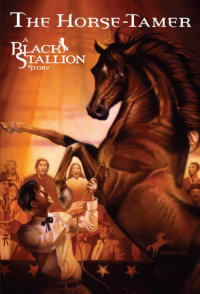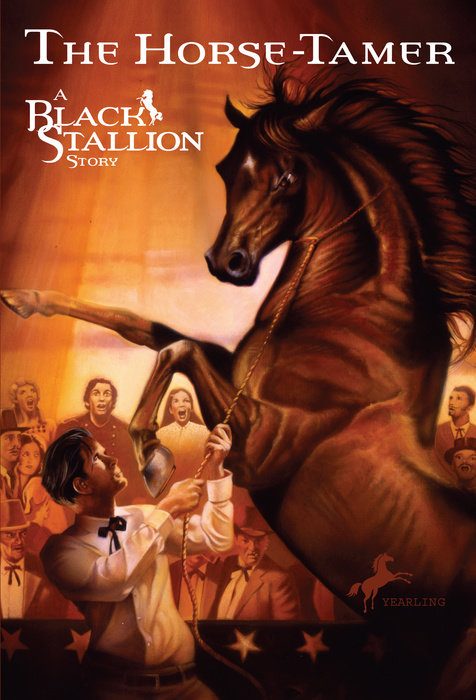The Horse Tamer
While waiting for a delayed airplane, old Henry Dailey, the Black's trainer, tells young Alec Ramsay a story of his own youth, travelling with his brother, Bill. Bill Dailey's talent as a horse-whisperer was unmatched in the days before the automobile and young Henry tells of an unscrupulous con-man who mistreats horses into behaving temporarily. Bill is determined to show that the man is a fraud, but can he unmask the con without getting hurt?Walter Farley experimented with many genres of writing and here, in his only foray into historical fiction, he weaves a fascinating tale of life when horses were the primary means of transportation.
An Excerpt fromThe Horse Tamer
CHAPTER ONE
A World of Horses
The old man's hair was as silver as the glistening wings of the plane; the youth's as red as the sun beyond the runway. The two of them stepped back quickly as the inboard engines caught, blasting the air. Above the even rumble the old man asked anxiously, "You're sure the Black's all right, Alec?"
"Positive, or I wouldn't have left him alone. When do we take off?"
"Not for a long while, I'm afraid. The chief mechanic said this is just routine preflight inspection. We're not goin' anywhere yet. We got trouble above."
"Trouble above?" Alec repeated wonderingly.
They looked at the sky together. It was soft, cloudless and empty.
"Traffic trouble, Alec. They've run out of air space."
"It doesn't look that way from down here."
"No, but they got avenues up there an' they go right across the Atlantic. They're jammed. The tower told the chief mechanic that a Pan Am and a TWA flight are coming in fifteen minutes apart. And there's a flight of air force jets behind 'em."
"You picked up a lot of information, Henry."
"I listen to 'em gab. They said it'll be at least two hours before we're cleared for takeoff."
"Imagine running out of air space," Alec said incredulously.
"Imagine bein' able to fly from Lisbon to New York in a matter of a few hours!" Henry echoed. "That's what gets me." His gaze returned to the airplane. Just a big hunk of metal going nowhere in particular, he mused--nowhere but across the Atlantic Ocean, or some two thousand miles of open water, carrying over three thousand gallons of gas and seventy thousand pounds of cargo, including them and their black horse. It was a fast-moving world, all right!
"I'm going back to the stable," Alec said.
"Me too. I'm more at home there," the old man replied.
Henry Dailey, who was in his sixty-second year of training and racing horses, followed Alec Ramsay around the airport administration building to a large livestock shed in the rear. He listened affectionately to the sounds of the penned and stabled animals. Most of them he recognized easily--the bawling calves, some pigs, an unhappy dog and of course the Black.
"But what's that chattering going on down at the far end?" he asked Alec.
"Monkeys," the boy answered. "They must have twenty of 'em in cages. Bound for U.S. zoos, the barn super said."
With the opening of his stall door the Black Stallion came forward quickly, his eyes alert and impatient.
"Not yet. Not yet, but soon," Alec told him softly.
The old trainer watched the Black dance in the straw, noting how much he favored his right forefoot. He had suffered a severe stone bruise in Europe and there'd be no racing him for a while. One didn't take chances with this kind of a horse. That's why they were going home.
Henry noted, too, that the famous stallion's coat shone as brightly as his eyes. While waiting for the plane's departure Alec had groomed him to within an inch of his life. His small ears were pricked, catching the strange sounds from the other animals. His fine head was held high. His every sense was alert. Every muscle, every sinew was ready to be unleashed with the power and swiftness of a coiled steel spring. The Black was all horse.
Nothing will ever take his place, the trainer thought. No multi-engined plane or jet, no rocket or missile or spaceship. There's always been need for a fine horse. There always will be. Or am I just an old fool to go on thinking so?
Henry Dailey bent down to the straw, carefully picking up the horse's injured foot. How many thousands of feet have I picked up, I wonder? he asked himself. How many thousands of days and nights have I spent at it? Someday he might figure it out. Just for the laughs.
Alec asked anxiously, "It's better, isn't it, Henry?"
"You asked me that only this morning," the trainer replied brusquely. "It's no better, Alec, no better at all. An injury like this takes time to heal. You got to be patient."
"I am patient," Alec said quickly, sensitive to the old man's sharp criticism. "I've got time, plenty of time . . . so has he. I was just asking."
Henry put down the Black's foot. "Have a seat then," he said more kindly, patting the straw beside him, "and let's stop rushin' from country to country an' from race to race. It's snug an' warm here and we have a fine horse to look at. What more could we want?"
"There!" Alec said, dropping to the straw beside the old man. "This is the life, all right," he agreed, laughing easily because he was very content.
"Yep, and I want to tell you a little more about this kind of life. It just might be that horses are goin' out of fashion." Henry's eyes weren't on Alec but on the oval-shaped hoofs buried in the straw. "Some of the things that have happened to horses might be forgotten with the world movin' fast like it is."
A strange, excited note came into the old man's voice as he asked suddenly, "Did you ever hear of a professional horse-tamer, Alec?"
"Trainer, you mean, Henry? Like you are?"
"No, Tamer."
"No, then. Lion-tamer, yes. Horse-tamer, no. Did he use a long whip and snap it in a ring?" Alec asked with attempted lightness.
"Sometimes," Henry answered seriously. "The whip was one of the tools of his trade and occasionally he had good use for it. There was a need for such men just before the turn of the century. The big trouble was that there weren't enough of them to go around. Most everybody had a horse, y'know. It was about the only way of gettin' from place to place. Yet few owners knew anything about horses except how to ride or drive 'em. When trouble arose, it was hard on both man and horse. That's when they started lookin' around for a horse-tamer."
Henry paused and Alec said, "They could have called him a trainer. A tamer makes you think of wild animals."
"Training takes time, Alec, as you know, and these men had no time. They did a job in a matter of hours--a few days at most--and then went on to the next case. Some of the horses, too, were worse than wild animals--vicious, mean horses. Most often, of course, they were the result of bad handling by their owners. But come to think of it, what kind of a job would you and I do on that plane outside? We're no mechanics and, as I say, so many owners in the old days weren't horsemen. They just needed a horse to get around. They made mistakes, plenty of 'em--and they suffered for it. So did their horses."
Alec chewed thoughtfully on a piece of straw. He was beginning to understand what Henry was getting at. He could imagine thousands upon thousands of horses developing bad habits and vices, most of them going from bad to worse because their owners had no professional ability or help. One horse kicked; a second balked; a third pulled against the bit and ran away; a fourth would not stand still to wait or to be shod or to be mounted; another would not back up; still others would bite or rear or throw themselves over backwards or refuse to work. Then again they would be afraid of umbrellas, blankets, carts, wagons, cows, baby carriages or something else. With all this happening in crowded city streets where horses were the sole means of transportation, people could be hurt or killed and property destroyed.
"Were you ever a horse-tamer?" Alec asked Henry.
"No, but my oldest brother was. I watched him at it. He was good."
"How good?"
"One of the best," the old man answered, his eyes bright with memories. "Bill was about thirty, I guess, when my father sent me off one summer to live with him. That was back in Pennsylvania. I was just a kid but not too young to learn a trade. . . ."
"You mean that horse-taming trade?"
"No, not that. Bill wasn't in it then. He was a carriage-maker and a good one." Henry laughed. "I remember that he always called me Hank an' I didn't like the nickname at all."
"So you became a carriage-maker," Alec commented.
"Not at all. Turned out that I didn't learn a thing about carriage making. I remember that first day pretty well. We were deliverin' a new buggy Bill had just finished to a Mr. Murray. . . ."
And then Henry went on with the story.

